GALLUP NEWS SERVICE
PRINCETON, NJ -- The American public continues to be sharply divided over U.S. policy in Iraq, with large differences in opinion between Republicans, who mostly support the war effort, and Democrats, who mostly oppose it. Independents align closer with the war's critics than its supporters.
Most people continue to disapprove of the way President George W. Bush is handling the situation in Iraq. Small majorities of Americans say the war has been a mistake and that the Bush administration deliberately misled the public about whether Iraq had weapons of mass destruction. Also, the vast majority of Americans expect U.S. troops to remain in Iraq for at least another year, though only a third expect troops to be there three years from now. There is no clear consensus on whether the new government in Iraq, if it turns out to be composed mostly of Muslim religious leaders, will signal a success or failure for U.S. policy.
The poll, conducted Jan. 20-22, shows that just 39% of Americans approve of the way President George W. Bush is handling the situation in Iraq, while 58% disapprove -- essentially unchanged from two December polls. Eighty-two percent of Republicans approve, compared with only 28% of independents, and 7% of Democrats. This distribution reflects a huge partisan gap between Republicans and Democrats of 75 percentage points.
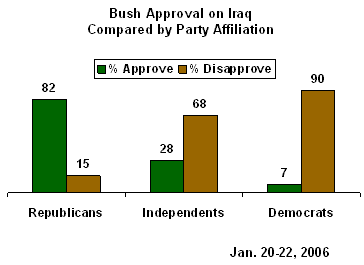
The poll also shows that 51% of Americans believe that the United States made a mistake in going to war in Iraq, while 46% disagree -- roughly the same break since mid-December.
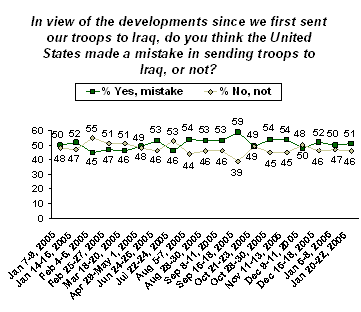
In the past year, typically more people have said the war was a mistake than have said it was not, but the division of opinion has been close. The average percentages from the Jan. 7-9, 2005, poll until now are 50.8% who say the war was a mistake, 47.5% who say it was not.
The partisan gap on this issue is large, though somewhat smaller than the gap on Bush approval. In the current poll, 76% of Democrats and 63% of independents say the war is a mistake, while only 14% of Republicans share that view -- a partisan gap of 62 percentage points.
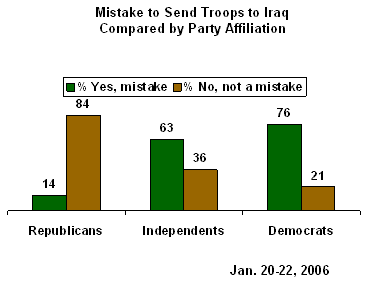
A similar gap is found on whether the Bush administration "deliberately misled" the public about weapons of mass destruction in Iraq. Overall, 53% say yes, 46% no -- a significant change from a year ago when the percentages were essentially reversed, though not much different from the reading last October.
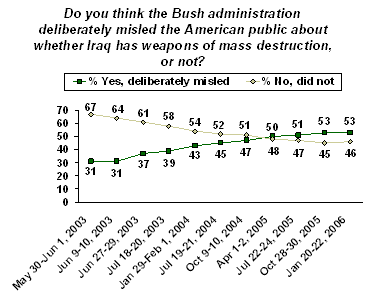
Again, Democrats are the most critical, with 84% saying the public was deliberately misled, compared with 59% of independents, and just 15% of Republicans -- a 69-point partisan gap.
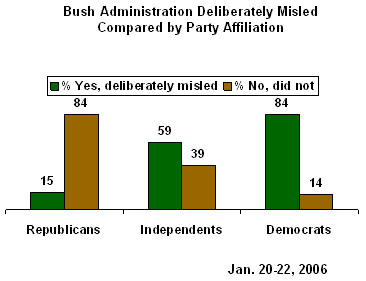
What Constitutes Success?
Partisan differences are less dramatic on whether the war will have been a success or failure if the Iraqi government emerges with mostly Muslim religious leaders in office. Overall, 49% of Americans say the war will have been a success in those circumstances, while 37% say it will have been a failure, and 14% express no opinion.
Suppose the new government in Iraq is composed mainly of Muslim religious leaders. If that is the case, do you think the U.S. war in Iraq will have been a success or a failure?
|
Success |
Failure |
No opinion |
|
|
2006 Jan 20-22 |
49% |
37 |
14 |
Among people who say that outcome will be a failure, about a third say it's because the Muslim religious leaders will probably be hostile to the United States, while most of the rest cite other reasons.
Would you consider it a failure primarily because you think those leaders would be hostile to the United States, or would you mainly consider it a failure for other reasons?
BASED ON 374 ADULTS WHO SAY THE WAR IN IRAQ WOULD BE A FAILURE IF THE NEW IRAQI GOVERNMENT IS COMPOSED MAINLY OF MUSLIM RELIGIOUS LEADERS
|
Hostile to U.S. |
Other reasons |
No opinion |
|
|
2006 Jan 20-22 |
36% |
60 |
4 |
Seventy-two percent of Republicans say the emergence of an Iraqi government dominated by religious leaders means the war would have been a success, compared with 45% of independents, and just 33% of Democrats.
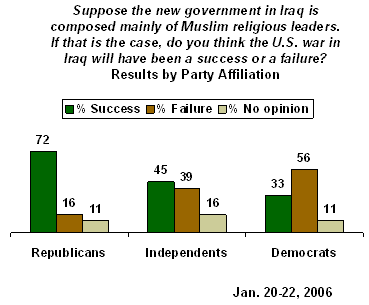
The 39-point gap between Republicans and Democrats on this issue is much smaller than the gaps on the other issues.
Most People Expect U.S. Troops to Remain in Iraq for at Least a Year
When predicting how long U.S. troops will remain in Iraq, only 17% of Americans expect a significant reduction within the next year. Another 47% predict withdrawal in one to three years from now, while 33% expect a significant U.S. troop presence in Iraq even after three years.
Just your best guess, how much longer do you think the U.S. will have a significant number of troops in Iraq -- less than three months, three to six months, six months to a year, one to three years, or longer than three years?
|
Less than |
Three to six |
Six months |
|
Longer than |
|
|
|
% |
% |
% |
% |
% |
% |
|
|
2006 Jan 20-22 |
1 |
2 |
14 |
47 |
33 |
2 |
|
2005 Dec 16-18 |
1 |
3 |
13 |
53 |
29 |
1 |
Partisan differences are relatively modest on this issue, with Republicans more optimistic about early troop withdrawal than either independents or Democrats. Only 22% of Republicans expect significant numbers of U.S. troops in Iraq after three years, compared with 39% of independents and 40% of Democrats.
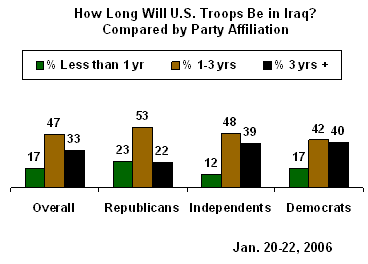
For a historical review of war support by party, see Related Items.
Survey Methods
Results are based on telephone interviews with 1,006 national adults, aged 18 and older, conducted Jan. 20-22, 2006. For results based on the total sample of national adults, one can say with 95% confidence that the maximum margin of sampling error is 卤3 percentage points.
For results based on the 506 national adults in the Form A half-sample and 500 national adults in the Form B half-sample, the maximum margins of sampling error are 卤5 percentage points.
For results based on the sample of 374 adults who say the war in Iraq would be a failure if the new Iraqi government is composed mainly of Muslim religious leaders, the maximum margin of sampling error is 卤6 percentage points.
In addition to sampling error, question wording and practical difficulties in conducting surveys can introduce error or bias into the findings of public opinion polls.
